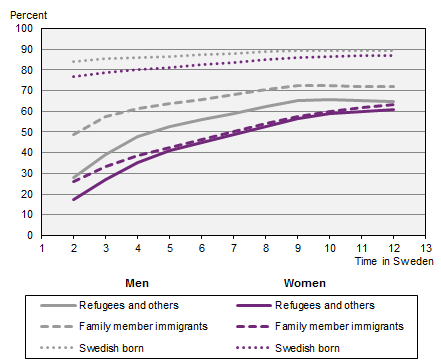Integration – establishment on the labour market:
Two out of three refugees are at work after ten years
Statistical news from Statistics Sweden 2014-12-09 9.30
Among refugees and family member immigrants who recently arrived in Sweden, few begin to work directly. Instead the most common activity is studies. In time the share that is gainfully employed increases, but the share is lower than among Swedish born persons even after ten years in the country.
These are the findings in a new report from Statistics Sweden. The report studies the trends for frequency of gainful employment for foreign born persons who immigrated to Sweden during 1997–1999.
Common to study after immigration
Of the group that has been studied, most had come as refugees or family member immigrants from countries outside the Nordic countries and the EU. The year after immigration, most of these persons were engaged in studies. In time the share that is gainfully employed increases. After 10 years in Sweden, roughly 60 percent of the women who immigrated as refugees or family member immigrants are gainfully employed.
Among the men, somewhat more than 60 percent of the refugees and around 70 percent of the family member immigrants are gainfully employed. Those who are not gainfully employed support themselves with unemployment insurance benefits or economic support, but income from among other things sickness benefits also exists. Some of these persons study instead of work, above all among the women.
The frequency of gainful employment increases with time in Sweden
Moving average for a 3-year time span

Frequency of gainful employment increases with the amount of time spent in Sweden, but after 13 years foreign born persons still have a lower frequency of gainful employment than Swedish born persons.
Age upon immigration and level of education significant factors
Foreign born persons who immigrated before age 40 have a frequency of gainful employment closer to the level of Swedish born persons than those who immigrated after age 40. The level of education is also significant. Similar to Swedish born persons, foreign born persons with upper secondary education or post-secondary education have a higher frequency of gainful employment than those with only compulsory school.
Definitions and explanations
The report studies foreign born women and men who immigrated to Sweden during the years 1997–1999, aged 20–49, who were registered in Sweden for 13 consecutive years. In addition to refugees and family member immigrants, labour force immigrants, students and citizens from the Nordic countries and the EU have also been studied.
To be classified as gainfully employed, the person must have been working for at least one hour a week during the month of November. The frequency of gainful employment is presented as moving averages for a period of three years. The results have been standardised based on age, which means that the frequency of gainful employment can be compared among groups with different age compositions, so that age does not affect the results.
Publication
Feel free to use the facts from this statistical news but remember to state Source: Statistics Sweden.
